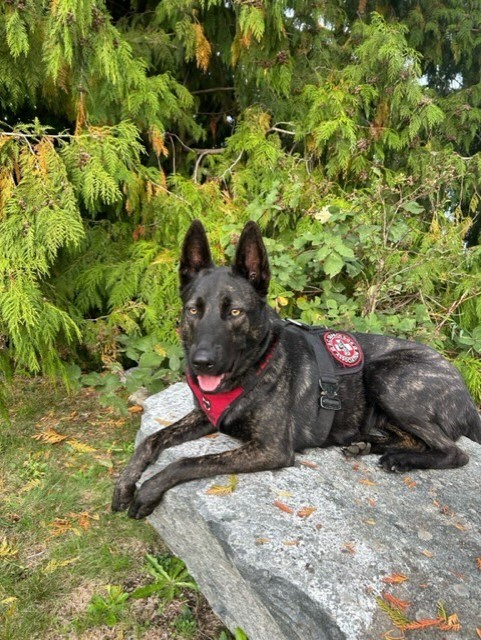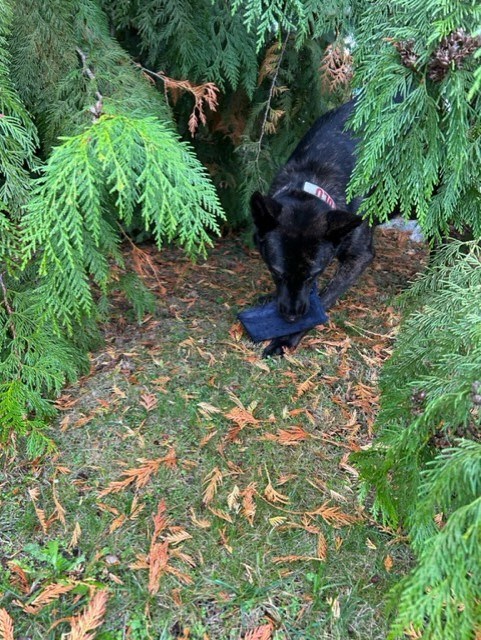Congratulations are in order for a special pup on the Sunshine Coast. Zulu earned her validation to become an official member of the Sunshine Coast Search and Rescue team at the end of September.
Her trainer and handler Joyce Tattersall, of the No Pawblems kennel, told Coast Reporter the validation process took place in Merritt, where hundreds of acres are available for the province’s search and rescue canine candidates to train and display their skills. Zulu impressed the RCMP canine handlers, who assess the dogs, by finding not one but two articles that had been accidentally left out for more than a year. (Echo, a canine member of Sunshine Coast SAR for many years, has also performed the same feat. Tattersall often leaves items out for long periods of time for her trainees to find, rather than just “fresh” items.)
Zulu, who is three years old, began training with Tattersall to eventually replace Echo. The nine-and-a-half-year-old Malinois has not slowed down — she’s still working at the rate of a five-year-old dog, Tattersall says — but is destined to retire when she turns 10, no matter how young she may seem.
For now, both Zulu and Echo are ready to be called upon to help find missing persons. Having two trained dogs means one can be on standby for the other and swap in when the first dog needs to rest. Tattersall likes to joke that the dogs get a break, but she (the only one allowed to handle the canines) does not. Not all handlers will train two dogs at once, as they are trained separately — two dogs are twice the work. But Echo “is pretty dialed in,” her trainer says. “She’s been doing it since she was two years old. So I don’t have to push the practice with her because she knows what she needs to do.”
Even before her validation, Zulu has helped out on the Sunshine Coast. When two men returned from berry picking in early September, one realized his wallet was missing. Tattersall was called to see if her dogs could locate it, and decided to use it as a way to help and train at the same time. She mobilized Echo and Zulu and, after 42 minutes and searching more than a kilometre of dense berry bushes, Zulu found the missing wallet.
More recently, Zulu visited the alternative school to demonstrate her skills to students. Tattersall said Zulu is her “party girl”, the more social of her two search and rescue dogs. While Echo tends to be more reserved and all business, Zulu thrives on being social. “She’s working when she’s working. When she’s off, she’ll be your best buddy.” While they’re trained separately, the two dogs play together and, as the wallet recovery showed, can work together if needed.
Although Tattersall brought the SAR truck with her, the students were more interested in the dogs. Tattersall shared what it’s like to volunteer and work with the dogs, then came the demonstration: Another SAR volunteer, Genevieve Pierre, helped the students hide to be discovered by Zulu. Zulu loves kids, Tattersall said, “So it was educational and a feel-good thing for the kids.”
As for Echo, her retirement will still include light training — she enjoys the routine and won’t come to a sudden stop. “It makes her feel important. She loves the work, she gets excited about it,” Tattersall said. If a search comes up empty-handed, Tattersall will throw out an item the dogs can find, to keep their spirits up. They want to do a good job.
More SAR news
On Oct. 7, the Royal Canadian Marine Search and Rescue (RCMSAR) hosted its member recognition event. More than 950 RCMSAR volunteers safely undertook 434 missions and completed more than 2,340 training exercises to assist 430 lives.
Among the top three missions of the Joint Rescue Coordination Centre recognized at the event was a missing person rescue from Poise Island in Sechelt Inlet on Feb. 13 by Station 12 (Halfmoon Bay) in coordination with the RCMP, Royal Canadian Air Force Transport and Rescue Squadron 442 Cormorant helicopter based out of Comox.




